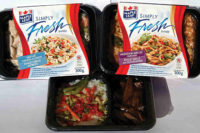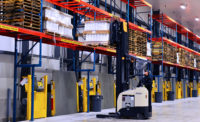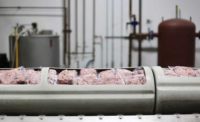Hear from processors, equipment manufacturers and toll processors how high-pressure processing offers a wealth of benefits to the cold food industry.
Despite the nation’s economic turmoil and the ongoing food recalls and contamination problems, the world of high-pressure processing (HPP) has remained robust.
In fact, according to a study, “The Food High Pressure Processing (HPP) Technologies Market 2013-2023-Pascalization & Bridgmanization,” produced by London-based Vision Gain, the HPP market is expected to show a strong performance in developing nations looking to introduce this “innovative shelf-life enhancement technique” into their production lines. Here’s a breakdown of the many benefits HPP offers the cold food industry.
525-liter systems revolutionize the world of HPP
When it comes to HPP manufacturing equipment, bigger is better. That’s why many of today’s suppliers are developing 525-liter capacity systems, which are said to be the largest-volume HPP machines to date.
For example, Avure Technologies, Franklin, Tenn., introduced a 525-liter HPP system, which delivers 8,135 pounds of HPP processing per hour, and uses ultra-high pressure instead of heat to inactivate foodborne pathogens and spoilage organisms in seafood, ready-to-eat proteins, deli meats meats, salads and fruit and vegetable beverages.
“Heat pasteurization has been used for many generations, but one problem with it is that it cooks out a lot of the vitamins and nutrients that are beneficial for consumers” says Tim Hunter, marketing manager. “Beverages are a great example of this. When high pressure is applied to a fruit juice, pathogens and spoilage organisms are inactivated. Enzymes slow down a bit, but are not destroyed. By the time the product arrives to the refrigerator shelves at the retailer, the enzymes are fully active and the vitamins and flavor profile are very close to the fresh-squeezed product.”
The 525L also achieves 10 cycles per hour with a 3-minute hold time, helps streamline installation protocols to shorten time to production and comes equipped with individually-alarmed key machine systems with a sole plate and pre-located bolt-down points to secure the frame support structure for added stability.
“Producers are also seeing new applications such as treating large, bulk packages of raw meat before final processing to avoid cross contamination from one line to another,” Hunter says. “[The 525L’s] larger-diameter pressure vessel allows for more flexibility in terms of the size of product that can be treated with HPP.”
Miami-based Hiperbaric USA released the Hiperbaric 525 Liter Integrated HPP system, capable of up 10 cycles and more than 8,000 pounds per hour.
“Being able to guarantee a 5-log reduction in pathogens without compromising quality or taste is our main advantage, but this does not mean you can do everything else wrong because you have HPP at the end of the line,” says Jaime Nicolás-Correa, global commercial manager and director of North America.
Fresher Evolution HPP, White Pigeon, Mich., provides 175L, 320L vertical, 350L, 525L and 8L lab machines, as well as aftermarket components, such as replacement vessels, intensifiers, HPP baskets, pallet solutions and material handling carts.
“Fresher Evolution has solved many of the core issues that have plagued the HPP equipment industry concerning maintenance and downtime,” says Gerald Ludwick, chief executive officer.
Understanding HPP tolling
In addition to large-volume HPP systems, more and more companies are getting involved with HPP tolling services.
Earlier this year, Universal Pasteurization, Lincoln, Neb., and its wholly-owned subsidiary, UPC Texas, LLC, Dallas, Texas, acquired the assets of Global Leading Foods, a Coppell, Texas-based HPP toll provider that is now called UPC-Texas.
“HPP tolling (outsourcing) is where a company purchases HPP equipment and sells time on the machine,” says Mark Fleck, HPP market development manager. “Food processors contract with the toller to HPP products per their specifications. The HPP toller charges their customers either by the piece or weight of the products HPPd.”
But, why turn to an HPP toll processor company when you can do it yourself?
“There are several advantages of using an HPP toll processor,” says Kelley Battles, founder and CEO of HPP Foods Group, Coppell, Texas (formerly known as Global Leading Foods). “HPP tolling allows food manufacturers into HPP without the investment in equipment. HPP tolling also allows for small companies to enter into the HPP product space and have a viable alternative to achieve longer shelf life and safer products. As well, HPP tolling can take a product that has a limited distribution area due to shelf life and give it the ability to be a national brand. For a retailer, it can greatly reduce shrink and eliminate a lot of food waste.”
Secondly, because HPP provides an added food safety element, it allows processors to create products that weren’t previously possible.
For example, in mid-June, Stay Fresh Foods, a Meriden, Conn.-based certified tolling partner of Avure Technologies, launched a second Avure 350L HPP line.
“The second system gives us redundancy,” says Amy Lawless, managing director. “HPP adds a layer of protection that allows consumers to enjoy fresh, natural products without worrying about safety. Along with enhanced safety, HPP is a tremendous innovation tool. Many of our customers have been able to develop new-to-market products, from fresh juices to value-added ready meals, thanks to the shelf life they can get with HPP.”
Meanwhile, Sandridge Food Corp., Medina, Ohio, invested in an HPP system purely to meet consumer demand.
“Our retailers and consumers today recognize the process as the best-known method for producing fresh food products without the excessive use of sodium and extending the life of the item on the shelf without the use of heat or pasteurization,” says Mark Sandridge, chief executive officer. “As a [food] manufacturer, our mission is to optimize the culinary integrity of our products alongside scaling up production to service the demands of the industry. HPP removes shelf stability as a component for crafting recipes. It allows our chefs to realize their passion and our mission—creating great-tasting food. [Tolling] is an economical advantage to manufacturers who aren’t able to reserve capital assets to bring the process in-house. For us, tolling is an ideal strategy to turn a profit from excess capacity.”
Garden Fresh Gourmet ignited the fresh salsa revolution thanks to its early adoption of HPP technology.
“We’ve long recognized the outstanding benefits this technology affords us in eliminating the use of artificial preservatives and extending shelf life far beyond what which you would expect for an all-natural food product,” says Jack Aronson, founder and president of the salsa, hummus and dip processor. “HPP is a cold pasteurization technology that virtually eliminates mold, yeast and bacteria in most foods without significantly affecting flavor profile, texture, color, etc. We chose HPP because it enables us to produce high-quality, all-natural foods with extended shelf life, while keeping nutritional properties and enzymes intact.”
Whether your company manufacturers HPP systems, provides HPP toll services or just applies the HPP technology, high-pressure processing offers that extra layer of food safety and extended shelf life necessary to produce high-quality products.
Go HERE to learn more about these and other HPP systems.











